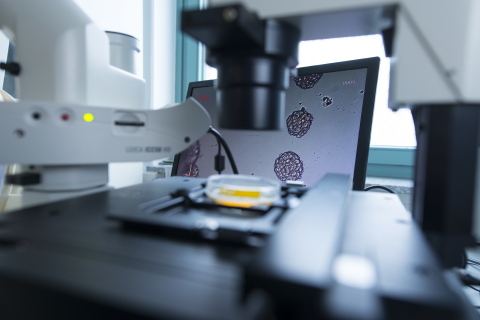Fraunhofer: wetenschappers ontdekken nieuwe mechanismen bij vroege uitzaaiing borstkanker
HANNOVER & REGENSBURG, Duitsland–(BUSINESS WIRE)– Onderzoekers van de projectgroep Personalized Tumor Therapy uit Regensburg hebben samen met collega’s van de Icahn School of Medicine at Mount Sinai nieuwe mechanismen ontdekt bij vroege uitzaaiingen van borstkanker. De resultaten zijn gepubliceerd in het nieuwste nummer van het vermaarde tijdschrift Nature (doi:10.1038/nature20785, doi:10.1038/nature20609).
Decennialang gold in kankeronderzoek het dogma dat kankercellen zich vooral vanuit gevorderde tumoren verspreiden. Dit idee was gebaseerd op de bevinding dat vroege diagnose en chirurgische verwijdering beslissend zijn voor de genezing van kankerpatiënten. Onlangs werd deze verklaring voor succes bij behandelingen ernstig in twijfel getrokken, omdat patiënten met kleine tumoren ook uitzaaiing hebben. Bovendien komt het genetische profiel van verspreide kankercellen vaak niet overeen met de primaire tumor. Afwijkingen van verspreide kankercellen, als voorlopers van uitzaaiing, blijken vaak al in de vroege ontwikkelingsfase van de tumor voor te komen.
Fraunhofer: Scientists Discover New Mechanisms of Early Metastatic Spread in Breast Cancer |
|||||
|
HANNOVER & REGENSBURG, Germany–(BUSINESS WIRE)– Scientists of the Regensburg-based Project Group for Personalized Tumor Therapy ( Fraunhofer ITEM/ University of Regensburg) and colleagues from Icahn School of Medicine at Mount Sinai discovered new mechanisms of early metastatic spread in breast cancer. Results have been published in the latest issue of the renowned journal Nature ( doi:10.1038/nature20785, doi:10.1038/nature20609). This Smart News Release features multimedia. View the full release here: http://www.businesswire.com/news/home/20161214005555/en/  For their studies, the researchers culture primary mammary gland cells. This results in the formation of so-called spheres, which enable experimental investigation of metastasis. (Photo: Business Wire) For their studies, the researchers culture primary mammary gland cells. This results in the formation of so-called spheres, which enable experimental investigation of metastasis. (Photo: Business Wire)
Over decades, cancer research pursued the dogma that cancer cells seed mainly from advanced tumors – based on the finding that early diagnosis and surgical removal are decisive for curing cancer patients. Recently, however, the validity of this concept in explaining treatment success has been questioned increasingly, because patients with small tumors also develop metastases. Furthermore, the genetic profile of disseminated cancer cells often does not show the expected similarity to the primary tumor. Derivation of disseminated cancer cells, as precursors of metastases, frequently seems to occur at early tumor evolution stages already. Researcher teams under Prof. Christoph Klein (Regensburg) and Prof. Julio Aguirre-Ghiso (New York) for the first time ever studied mechanisms of early metastatic spread in breast cancer. They found that breast cancer formation hijacks physiological processes controlling mammary epithelial branching and expansion during adolescence and pregnancy, deregulates and uses them for tumor cell dissemination. Once disseminated, these cells settle in other tissues and, after further genetic alterations, can grow to often life-threatening metastases in the target organ. The two research teams initially worked independently, but then collaborated and published their results simultaneously in Nature. “Our fundamentally new findings will hopefully advance cancer research substantially,” Klein explains. The researchers hope that the proposed mechanism will provide a general framework for understanding metastasis formation. According to their findings, cancer cells first go through an early dissemination stage at low cell density at the primary site and later on switch to a proliferation stage when high cell density is reached. However, the Regensburg scientists also found that tumor cells can “relearn” to disseminate even at later stages – from areas of low cell density. This is probably why metastases may derive from different stages of primary tumor evolution, both early and late. Since these stages comprise genetically different cells and modern therapeutic approaches often target genetic alterations, therapies targeting the seed of metastasis need to address this heterogeneity of cells to be successful. View source version on businesswire.com: http://www.businesswire.com/news/home/20161214005555/en/ Contacts Fraunhofer ITEM |
|||||
